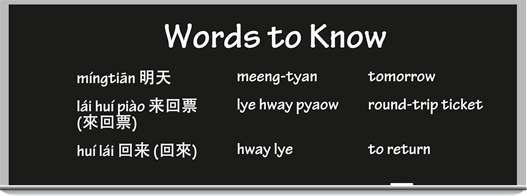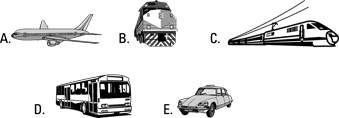Chinese For Dummies (116 page)
Read Chinese For Dummies Online
Authors: Wendy Abraham

 Zhèige zuòwèi yÇu rén ma?
Zhèige zuòwèi yÇu rén ma?
è¿ä¸ªåº§ä½æ人å
? (
è¿å座ä½æ人å
?) (jay-guh dzwaw-way yo run mah?) (
Is this seat taken?
)
Talkin' the Talk
Candice is at the Beijing train station to buy a round-trip ticket to Shanghai for tomorrow. She approaches a ticket agent to purchase her ticket.
Candice:
QÇngwèn, yÇu méiyÇu mÃngtiÄn qù Shà nghÇi de huÇchÄ pià o?
cheeng-one, yo mayo meeng-tyan chyew shahng-hi duh hwaw-chuh pyaow?
Excuse me, do you have any train tickets to Shanghai for tomorrow?
Ticket agent:
YÇu. YÃ o jÇ zhÄng?
yo. yaow jee jahng?
Yes. How many would you like?
Candice:
ZhÇ yì zhÄng lái huà pià o. Xià ge lÇbà iyÄ« yà o huà lái.
jir ee jahng lye hway pyaow. shyah-guh lee-bye-ee yaow hway lye.
Just one round-trip ticket. I'd like to return next Monday.
Ticket agent:
HÇo. Yà o yìngwò, ruÇnwò, háishì ruÇnzuò?
how. yaow eeng-waw, rwahn-waw, hi-shir rwahn-dzwaw?
Okay. Would you like a hard sleeper, a soft sleeper, or a soft seat?
Candice:
WÇ yà o yì zhÄng ruÇnwò. Xièxiè.
waw yaow ee jahng rwahn-waw. shyeh-shyeh.
I'd like a soft sleeper. Thanks.

 Â Fun & Games
 Fun & Games

How do you say these types of transportation in Chinese? (Flip to
Appendix D
for the answers.)
A. ______________
B. ______________
C. ______________
D. ______________
E. ______________
Chapter 17
Asking for Directions
In This Chapter
 Asking “where” questions
Asking “where” questions
 Covering time and distances
Covering time and distances
 Picking out specific spots with ordinal numbers
Picking out specific spots with ordinal numbers
 Pointing the way with directional coverbs
Pointing the way with directional coverbs
E
veryone (yes, even you) has to ask for
fÄngxià ng
æ¹å
(fahng-shyahng) (
directions
) at some time or another. Even if you just need to find the bathroom â when you've got to go, you'd better know.
You may find yourself baffled by the boulevards in Beihai or dumbfounded by directions in Dalian. This chapter helps you figure out exactly how to ask for directions before you ever
mÃlù
è¿·è·¯
(mee-loo) (
get lost
). Whether you lose your bearings in Beijing or wander off the path in Luoyang, this chapter gives you helpful tips that make it easier to find your way back home. Or at least back to your hotel.
 You definitely need to know how to ask where certain places are in mainland China, where most people don't speak English. You have a greater likelihood of hailing an English-speaking cabbie in Taipei or Kowloon to take you where you need to go than you do in one of the cities or towns in mainland China, but you can't bank on that.
You definitely need to know how to ask where certain places are in mainland China, where most people don't speak English. You have a greater likelihood of hailing an English-speaking cabbie in Taipei or Kowloon to take you where you need to go than you do in one of the cities or towns in mainland China, but you can't bank on that.
Avoiding 20 Questions: Just Ask “Where?”
Okay, so you're searching for the closest post office to mail a package home before your mother's birthday next week. A passerby tells you to go right down the street, but for the life of you, all you see are a couple of bookstores and an occasional subway station. Time to ask for directions. But how?
 The easiest way to ask where something is in Chinese is to use the question word
The easiest way to ask where something is in Chinese is to use the question word
nÇr
åªå¿
(
åªå
) (nar) (
where
). But you can't just say
nÇr,
or folks still won't know what you're talking about. You have to use the coverb
zà i
å¨
(dzye), which can be translated as
in
or
at,
in front of
nÇr
(zà i nÇr).
(A
coverb
is officially a verb but functions as a preposition.) Just put the name of whatever you're looking for before the word
zà i
to create a complete question:
NÇ zà i nÇr?
ä½ å¨åªå¿
? (
ä½ å¨åªå
?) (nee dzye nar?) (
Where are you?
)
ShÅ«dià n zà i nÇr?
书åºå¨åªå¿
? (
æ¸åºå¨åªå
?) (shoo-dyan dzye nar?) (
Where's the bookstore?
)
Yóujú zà i nÇr?
é®å±å¨åªå¿
? (
éµå±å¨åªå
?) (yo-jyew dzye nar?) (
Where's the post office?
)
Here are some places you may be looking for when you lose your way:
 cèsuÇ
cèsuÇ
åæ
(
å»æ
) (tsuh-swaw) (
bathroom
)
 chÅ«zÅ« qìchÄzhà n
chÅ«zÅ« qìchÄzhà n
åºç§æ±½è½¦ç«
(
åºç§æ±½è»ç«
) (choo-dzoo chee-chuh-jahn) (
taxi stand
)
 dìtiÄzhà n
dìtiÄzhà n
å°éç«
(
å°éµç«
) (dee-tyeh-jahn) (
subway station
)
 fà nguÇn
fà nguÇn
é¥é¦
(
飯館
) (fahn-gwahn) (
restaurant
)
 gÅnggòng qìchÄ zhà n
gÅnggòng qìchÄ zhà n
å
Œ
±æ±½è½¦ç«
(
å
Œ
±æ±½è»ç«
) (goong-goong chee-chuh jahn) (
bus stop)